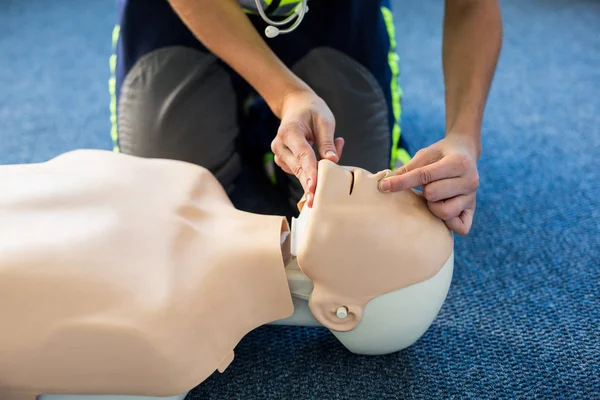Why Aged Care Workers Need Aged Care Emergency Training Now More Than Ever
Workers in aged care are essential for ensuring the safety and health of elderly individuals, who represent a particularly vulnerable group. As the need for aged care services grows and health issues become more intricate, these professionals need to be prepared to respond effectively to emergencies. Emergency training has transitioned from being a supplementary skill to an essential requirement for aged care workers. This article will discuss the significance of emergency training in the current aged care sector and highlight its advantages.
The Growing Need for Aged Care Emergency Training
Increasing Elderly Population
The world's population is experiencing a swift increase in the number of older individuals. The World Health Organization(WHO) projects that by 2050, there will be approximately 2.1 billion people aged 60 and above. This significant rise will lead to a heightened need for elderly care services, which will increase the burden on caregivers. As more seniors are added to the population, the likelihood of health crises—like strokes, falls, and heart problems—also escalates. Aged care professionals need to receive adequate training to respond effectively and promptly to these emergencies.
Complex Health Conditions
Older adults frequently experience a range of health issues, such as long-term illnesses like diabetes, cardiovascular problems, and dementia. These ailments heighten the risk of emergencies, necessitating prompt action from caregivers. Training for emergencies equips staff to manage various situations, including falls, broken bones, and unexpected heart attacks or seizures. In the absence of adequate training, even small incidents can develop into critical emergencies.

Changes in Care Settings
In recent times, there has been a growing trend towards providing care in the home and within the community, enabling seniors to remain in their residences as they grow older. This transition offers a more familiar and reassuring setting; however, it also implies that caregivers may be the primary or even sole responders during emergencies. Unlike care facilities that have immediate access to medical personnel, home care places the burden of initial emergency intervention directly on the caregiver.
Therefore, proper training is crucial for these workers to effectively stabilize patients and mitigate any complications until professional medical assistance can be obtained.
The Benefits of Emergency Training for Aged Care Workers
Faster Response Times
In critical situations, time is of the essence. Adequate emergency training equips aged care staff to act promptly, delivering essential interventions to ensure a patient's stability. Whether it involves administering CPR, managing bleeding, or giving medication, a rapid response can greatly influence the results of such emergencies. Taking swift action can avert additional complications and, in certain instances, even save lives. Click here to know more about aged care emergency training.

Enhanced Patient Safety
A key objective of elderly care is to ensure a safe and protected setting for seniors. Emergency preparedness training equips caregivers with the skills to spot potential hazards and implement preventive actions. This includes being able to detect early symptoms of a stroke, keeping track of vital signs, and preventing falls or injuries among the elderly. Caregivers who receive this training play an essential role in improving the safety of their patients.
Improved Confidence Among Workers
Workers in aged care frequently encounter demanding circumstances. In the absence of adequate skills or understanding, they may suffer from stress, anxiety, and diminished self-assurance when faced with emergencies. Thorough emergency training enhances their assurance, enabling them to manage challenging situations with composure and effectiveness. This increased confidence not only elevates their job performance but also leads to improved patient care. When caregivers feel competent, they are more inclined to deliver exceptional and compassionate support, even during crises.
Legal and Ethical Responsibilities
In various areas, it is a legal obligation for aged care homes to maintain a secure atmosphere for their residents. If emergencies are not handled correctly, it can result in legal repercussions for both the staff and the establishment. Adequate emergency training plays a crucial role in reducing these risks by making sure that employees understand their legal and moral duties during crises. Caregivers who have received proper training are more capable of accurately recording incidents, adhering to established protocols, and meeting legal requirements, thereby safeguarding themselves and the facility from possible litigation.
Emergency Training in Specific Scenarios
Responding to Medical Emergencies
- Elderly individuals face an increased likelihood of experiencing unexpected health emergencies, including strokes, heart attacks, and seizures.
- In these critical moments, having a solid understanding of basic life support (BLS) is vital. Proficiency in cardiopulmonary resuscitation (CPR) is imperative for effective emergency intervention.
- Knowing how to use automated external defibrillators (AEDs) can make a significant difference in saving lives.
- Caregivers equipped with these key skills can: Maintain the flow of oxygen to the brain and other essential organs, greatly improving survival rates during crises.
Dealing with Falls and Fractures
- Among older adults, falls rank as one of the most frequent types of accidents.
- Such incidents frequently lead to fractures or serious injuries.
- As part of their emergency training, aged care professionals learn essential skills to safely assist individuals who have fallen, thereby reducing the risk of worsening their situation.
- They are also taught safe methods for lifting or moving patients.
- Comprehensive training is crucial in lowering the chances of injury for both caregivers and the seniors they support.
Fire and Evacuation Protocols
- In aged care facilities, caregivers need to be ready for a range of emergencies such as fires and natural disasters.
- Staff must receive training in fire safety and evacuation protocols, particularly when working with elderly residents who may have limited mobility.
- This training equips staff to effectively evacuate residents during crises and offers extra assistance to those who require it.

